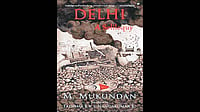As Monty and Sunny, two of the three main characters in The Runaways, wait endlessly in the middle of the blistering Iraqi desert after days of a long march, a sense of uncertainty grips the two young jehadi recruits. “This whole exercise felt like a waste. What were they doing? No one from the Ummah Movement had bothered to check on them, no one debriefed them, no one even seemed to know they were out here.”
It is this bumpy journey towards radicalism that Fatima Bhutto attempts to explore in her new novel, through the intersecting lives of Sunny aka Salman Jamil, son of a Lucknowi immigrant in Britain, Monty (aka Mustafa), the scion of an affluent Pakistani family who is unenamoured by his legacy, and Anita Rose, the Christian girl from a Karachi slum who wants to soar high above the shackles of her gender, religion and poverty.
Along the way, Bhutto tackles the millennial insecurities of the Muslim youth, primarily through Sunny, the lonely boy growing up in Portsmouth. Embarrassed by his father's attempts to blend in with the Brits, frustrated by those mocking Taliban jokes lobbed at him and battling questions of identity and sexuality, Sunny finds himself clamped down in his insular world. Trying to deal with the unremarkability of his life and surfing for answers in YouTube sermons, the wall around him seems unscalable until the meeting with his Syria-returned cousin Oz, who seems to have all the right and ready answers.
The search for a purpose in life is what takes the three young characters to the dusty nowhere in Iraq but it’s not certain if this is the new world order they were seeking. For Monty, it’s the search for Layla, the love of his life, that brings him to Mosul. For Anita, her new avatar as preacher of violence and redemption is the ultimate fightback for all the crosses that she has had to bear. It’s also a promise that she must keep for Osama, the avuncular neighbour who had fired her intellect and hunger for freedom. As for Sunny, it’s the journey itself that completes his descent, or ascent as he’d like to believe, into manhood. “Yesterday, he cut a man's throat, and now he gazes upon the dying stars and sings to his Kalashnikov.”
The walk into the novel is much like the long haul across Mosul’s arid landscape. Bhutto takes a back-and-forth narrative spanning four years, dwelling rather inordinately long on her characters, and hopping from Portsmouth to London to the ghettos of Gulshan and posh enclaves of Clifton in Karachi. Halfway into the novel, the terrain shifts to Mosul and then Nineveh, the setting for the dramatic finale. This is perhaps unfamiliar ground, as Bhutto has revealed in interviews, where she has had to mine information from books, LiveLeak videos, and other online sources. But perhaps paradoxically, that’s where the narrative gets taut, starker and more pulsating. That’s when the characters too get denser and less pixellated. And it’s in these passages that Bhutto triumphs as a writer.
























